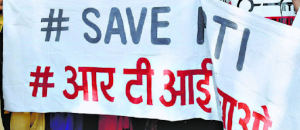13 Oct The piling RTI complaints with Information Commissions
The Article is Based on RTI Act
The topic talks about Indian Polity and Governance – The constitutional significance of the piling RTI complaints with Information Commissions under the RTI Act
CONTEXT
A recent report released by the Satark Nagrik Sangathan, titled ‘Report Card on the Performance of Information Commissions in India, 2021-22’, shows the grim state of the Right to information in India despite 17 years of passage of the Right to Information (RTI) Act, 2005. The report shows that around 3.15 lakh complaints and appeals are pending before the Central and State Information Commissions across India. It further states that the backlog of complaints and appeals is continuously increasing in commissions every year.

Pic: The piling RTI complaints with Information Commissions
THE RIGHT TO INFORMATION ACT, 2005
- The Right to information is an integral right of citizens of the country.
- It is a fundamental right under Article 19(1) of the Constitution which states that every citizen has freedom of speech and expression.
- The Supreme Court in the case of Raj Narain vs State of UP, 1976 said that people cannot speak or express themselves unless they know. Hence, the right to information is embedded in Article 19.
- The Right to information act was passed to provide transparency and accountability to the people. It enabled citizens to request information from any “public authority” and the public authority is bound to reply within 30 days. In case the information sought concerns the life or liberty of a person, it has to be provided within 48 hours.
- The act also requires public authorities to proactively publish certain categories of information.
- The Act provides for the appointment of Information Commissioners at the Central and State level. Further, Public Information Officers are appointed to give information to persons who seek information under the RTI Act.
IMPORTANT PROVISIONS OF THE ACT
- Section 2(f): “Information” means any material in any form, including Records, Documents, Memos, e-mails, Opinions, Advice, Press releases, Circulars, Orders, Logbooks, Contracts, Reports, Papers, Samples, Models, Data material held in any electronic form and information relating to any private body which can be accessed by a Public Authority under any other law for the time being in force.
- Section 4 of the Act provides for suo motu disclosure of information by each public authority. However, such disclosures have not happened regularly
- Section 8(1) lists exemptions against furnishing information under RTI Act.
- Section 8(2) provides for exemption of disclosure of information under the Official Secrets Act, 1923 if a larger public interest is involved.
RIGHT COVERED UNDER THE RIGHT TO INFORMATION ACT, 2005
Right to Information Act 2005 empowers every citizen to:
- Ask any questions from the Government or seek any information
- Take copies of any government documents
- Inspect any government documents.
- Inspect any Government works
- Take samples of materials from any Government work
SIGNIFICANCE OF RTI
- Brings accountability: RTI enables the people to hold their elected representatives as well as organizations substantially financed by the government accountable.
- Helps to promote Good Governance: Good governance involves accountability, transparency, predictability, and participation. This is possible only when the general public has availability of information which is ensured by RTI.
- Fight corruption: RTI has been used to bring to light various scams in the past. It is an effective tool to fight corruption. Information gathered through RTI helped to expose massive corruption in the Public Distribution System in Delhi and immediate action regarding this was taken.
- Strengthens participatory democracy: It leads to people’s participation in the governance of the country. It also improves decision-making due to public oversight.
CHALLENGES AND FINDINGS OF THE REPORT
The act has limitations and the performance has not been up to the mark. The Satark Nagrik Sangathan Report highlights this.
- Pending cases: The pendency is high and increasing every year. From 2,33,384 complaints in 2020, the number of pending complaints increased to 2,86,325 in 2021 which further increased to 3,14,323 in 2022. The highest number of pending cases was reported from Maharashtra where 99,722 complaints and appeals are awaiting answers and disposal.
- Defunct Commissions: The report highlighted that two out of 29 information commissions across the country are completely defunct
- Lack of Women’s representation: Currently, only 5% of the positions in the information commissions are being occupied by women.
- Non-imposition of Penalty: The report found that commissions did not impose penalties in 95% of the cases where the nature of the case demanded that penalties should be imposed.
- Vacancies: Currently, 41 out of 165 posts of Chief Information Commissioner and information commissioners are vacant
WAY AHEAD
- Simplify filing RTI: The filing of applications should be simplified as the literacy rate in the country is low and hence people find it difficult to follow the procedure.
- Promoting usage of Digital RTI Portal: The portal was made under the Digital RTI Mission. Visitors can access information acquired through RTI Act on the portal
- Penalize officer: clear procedure should be made for penalizing the officer, who denies information
The RTI Act is also called the “sunshine Act”. It is necessary that it is properly implemented in letter and spirit and the issues plaguing it are addressed quickly so that it can truly function as the sunshine act
SOURCES:
Daily Current Affairs for UPSC
Get Daily Current Affairs for UPSC from Plutus IAS. We provide daily current affairs for UPSC examination free of cost.
Download PDF:



No Comments